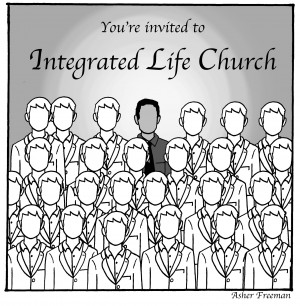
In 1963, preaching at Ebenezer Baptist Church in Atlanta, the Rev. Martin Luther King Jr. said, “I am ashamed and appalled that 11 o’clock on Sunday morning is the most segregated hour in Christian America.”
Five decades later, Sunday mornings remain a highly segregated hour. Roughly 5 percent of the nation’s churches are racially integrated, and half of them are in the midst of transitioning to either all-white or all-black, according to CNN.
This means that 95 percent of churches in America are almost exclusively dominated by one majority race, with less than 5 percent of the church population composed of the church’s minority race.
Why does church remain such a segregated spectrum of American society?
History undoubtedly plays a role. In the aftermath of slavery and the continued racial tensions in America, naturally ethnic groups decided to go their own way when it comes to religious services.
For many pastors, race is an issue they simply do not want to mess with. Along with the numerous responsibilities of leading a church, pastors do not want to deal with an issue as sensitive as race because it is just another issue in addition to running a church.
Josh Vaughan, the pastor at Columbus Avenue Baptist Church, said the church is diverse in terms of age and socioeconomic statuses, but racial diversity is lacking on Sunday mornings. To promote multicultural growth, Vaughan said the church has a Hispanic service conducted in Spanish at a separate center and the church also allows an African-American group to hold its worship services in that building. Vaughn said giving African-Americans a place of worship allows the group to more freely touch on points that are more identifiable to their culture.
Why do ethnic groups seek out churches already established with a majority of they own ethnic group on Sundays? Perhaps, given the struggles of race during the work week, people just want a break from racial tensions on Sunday for church, or maybe it is just comforting to be at church with people who are all the same.
The race of the pastor often influences the majority race of the church. It is understandable that people want Sunday to be comfortable at church. People want to feel relaxed with people of the same ethnic group, but it cannot hurt to at least make a genuine effort to be conscious of the racial divide at church.
If someone from outside of the church’s majority ethnic group is present at church, make an effort to make them feel comfortable and welcome. It can be difficult to walk into a church and feel alone based solely on racial and ethnic grounds.
Christian churches are not trying to be racist or prejudiced; it is just a tendency of human nature to seek affirmation with people of the same ethnic group. However, trying to feel comfortable within a church community can easily turn into a slippery slope that includes unintended prejudices and unseen, or unnoticed, racial tensions.
The Christian faith was built upon a foundation of inclusivity for all. When Christians were persecuted under Roman society, early Christians were known to be a diverse group including Jews, Greeks, Africans, slaves, men and women. The spectrum of Christianity should be colorblind.
Jesus made a conscious effort to reach out to people who felt judged, persecuted, belittled and different from the rest of society. We, as the body of Christ, should also make the same kind of effort to include everyone at church as 1 Corinthians 12:13 says, “For in one Spirit we are all baptized into one body — Jews or Greeks, slaves or free — and all were made to drink of one Spirit.”






